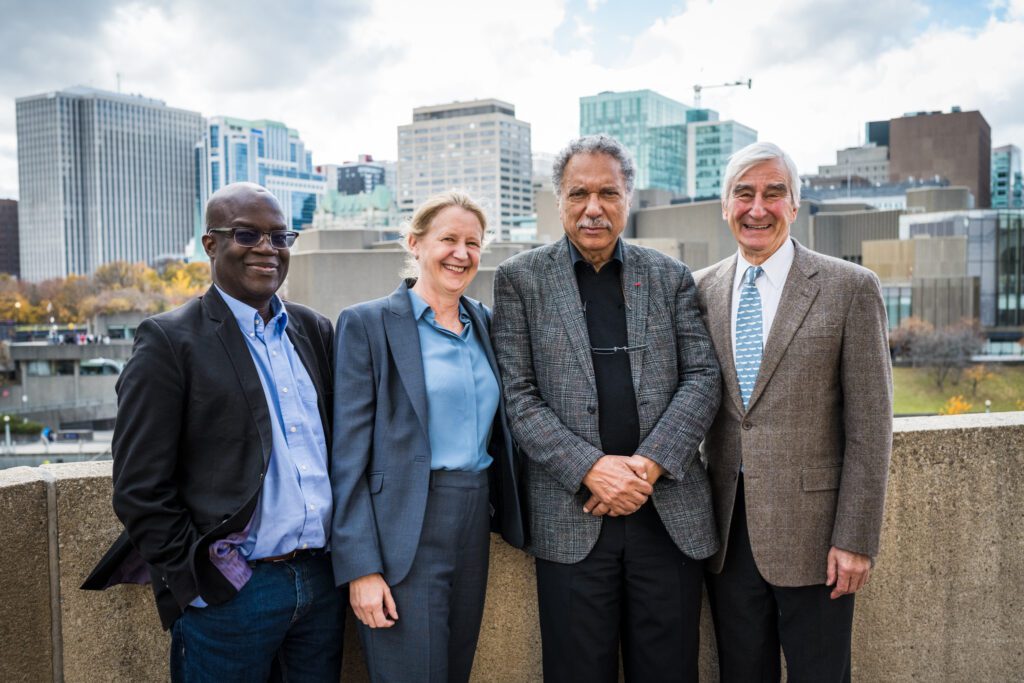April 26, 2023
Stewards of the Sea
Dr. Daniel Pauly and Dr. Rashid Sumaila receive top environmental honor
Oceana’s Board Members Dr. Daniel Pauly and Dr. Rashid Sumaila were selected as the co-recipients of the prestigious 2023 Tyler Prize for Environmental Achievement, which honors leading scientists and researchers for innovative contributions in the fields of environmental science, environmental health, and energy.
The Tyler Prize Committee honored Pauly with the award for his “critical contributions to fisheries ecology and conservation through the development of new ecosystem-based analytical approaches to assess global effects on world fisheries, and for helping the public visualize the decline of global fish stocks through The Sea Around Us and FishBase.”
Sumaila received the award in recognition of his “integration of economics, ecology, and other disciplines to sustainably manage ocean fishery resources for the benefit of current and future generations.”
We asked Pauly and Sumaila to reflect on their work and what this award means to them.
Dr. Daniel Pauly
Receiving an award as respected as the Tyler Prize has forced me to reflect on my career. In contrast to my usual ruminations – which tend to be focused on mistakes – I’ve decided I should concentrate on the things that worked, bringing us to this wonderful award.
Since the beginning of my career, I’ve aimed to empower my colleagues in the Global South, who had little access to the methods developed to study fisheries and draw inferences about the effects of exploitation on fish populations in the Global North. I programmed existing methods and invented new ones on programmable calculators, later on microcomputers, which were widely adopted in the early 1980s.
This desire to empower colleagues eventually drove me, working with numerous others, to create and make relevant fishery data available through CD-ROM and later via the internet. For a long time, we didn’t have enough information about tropical fishes or a simple way to access that information. Starting in the late 1980s, I worked with Rainer Froese, a German colleague, and Filipino colleague M.L. “Deng” Palomares to initiate a database of basic information on fish that has since grown into FishBase (fishbase.org), which now covers all the fish of the world and is consulted daily by millions of users.
In the mid-1990s, when I moved from the Philippines to Canada, I began to document that the pathologies of fisheries I had observed throughout the Global South also occurred with the heavily subsidized fisheries of wealthy countries. I became involved with civil society, leading me to become a member of Oceana’s Board of Directors in 2003. I saw the need to address the lack of reliable information on industrial and artisanal fisheries everywhere, including in wealthy countries. This led us to create the Sea Around Us (seaaroundus.org), a database and website that presents fisheries catch data and related statistics for all countries of the world, including subsidies that I worked on with Rashid Sumaila, my friend, colleague, and fellow recipient of this award.
I hope that the Tyler Prize will help us raise the funding required to maintain FishBase and Sea Around Us database and website, which, like Wikipedia, are used by many but require resources to remain free public services.
Moving forward, my own research will increasingly focus on why fish and other animals that breathe water are extremely sensitive to the warming and deoxygenation of their world. Understanding this understudied topic will be crucial to mitigate, to the extent possible, the effect of global warming on the world’s oceans and freshwaters, and I hope to spread this message in the years ahead.

Chair Sam Waterston. © Oceana Canada/Evermaven
Dr. Rashid Sumaila
Consider the basic model of the relationship between people and the ocean. When we go to the ocean we do essentially two things. First, we take the things we want or need and bring them into our economic, social, and cultural systems, and do what we will with them. Then at the end, we generate waste and pump it back into the ocean. So, from the ocean good things come and to the ocean bad things go! Clearly, if we don’t use wisdom in how we take the good and dispense the bad, we can end up with a dead ocean with little or no life, which will undermine the mission to “save the oceans, feed the world.”
I won this award for my contributions to the development of what I call “interdisciplinary ocean and fisheries economics,” which seeks, through the integration of economics with other disciplines, to ensure that we do not end up with a dead ocean but rather “Infinity Fish.” I work at local, national, and global scales, since the ocean is present at all of them. Simply put, the whole world is my workplace. I have experience working in fisheries and natural resource projects in North America, Europe, Southern Africa, West Africa, Latin America, the Caribbean, the Pacific region, and the South and East China Seas.
My work has challenged today’s approaches to marine governance, generating exciting new ways of thinking about our relationship to the marine biosphere (e.g., protecting the high seas as a “fish bank” for the world); removing harmful subsidies, as estimated in collaboration with Daniel Pauly and Sea Around Us; and using “intergenerational discount rates” to evaluate natural resource projects based on the costs and benefits to future generations.
Winning the Tyler Prize is humbling, as it puts me among a select group of scientists. I am also pleased to receive this award during Black History Month because I hope that it can inspire Black people and others who have been historically excluded to keep pushing for a place under the sun to reach their own potential. Finally, this award is a recognition of excellence in interdisciplinary ocean and fisheries economics, a field that I hope will get a boost because the world needs more of it.



